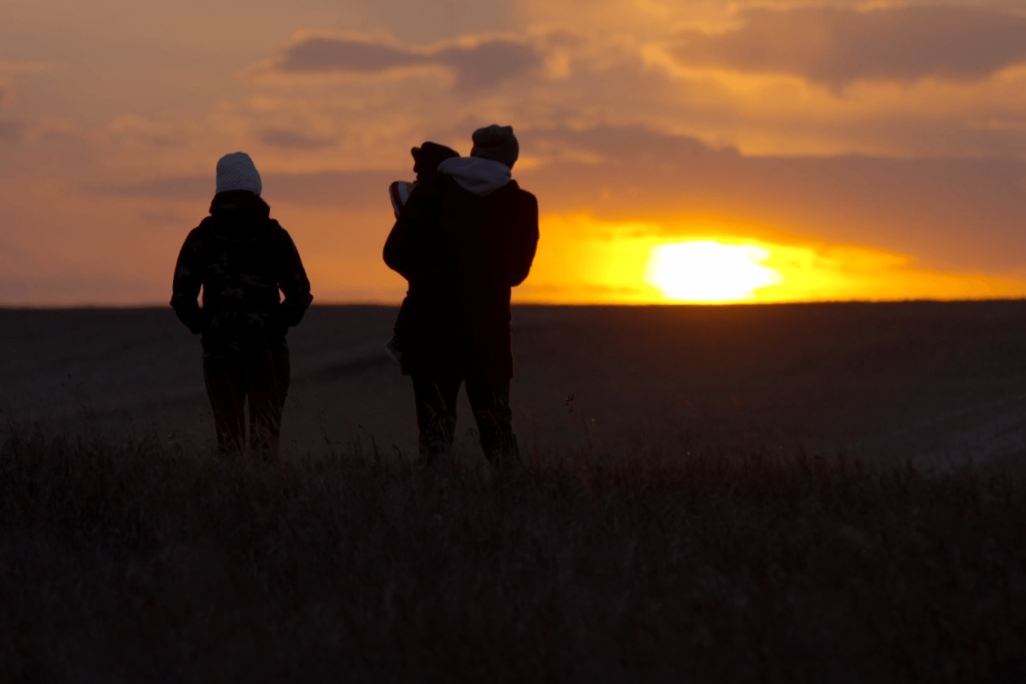kiskisiyâpiyawin ‘threads of memory’
12 June 2021 – 13 October 2021
About the Exhibition
Curated By
Janine Windolph
Organized By
MacKenzie Art Gallery
Galleries
Shumiatcher Theatre
kiskisiyâpiyawin ‘threads of memory’ is a curation of short films that weave together stories reflecting experiences before and during the COVID pandemic from the lens(e) of Indigenous and Canadian filmmakers. Each short film offered by the filmmaker is a story bundle that can be appreciated on its own, each approach ranging from a personal perspective to that of a witness. This program offers a variety of perspectives from diverse communities within Canada
The Films:
Candy Fox, ahkâmêyimo nitânis (Keep Going, My Daughter), 12 minutes, 2019.
Indigenous educators Andrea Landry and Colby Tootoosis journal love letters to their young daughter determined to break the cycle of colonial violence and intergenerational trauma on the beautiful, Saskatchewan prairies.
Janine Windolph, Stories are in Our Bones, 11 minutes, 2020.
In this layered short film, filmmaker Janine Windolph takes her young sons fishing with their kokum (grandmother), a residential school survivor who retains a deep knowledge and memory of the land. The act of reconnecting with their homeland is a cultural and familial healing journey for the boys, who are growing up in the city. It’s also a powerful form of resistance for the women.
Weiye Su, Jia, 10 minutes, 2020
A young Chinese-Canadian couple is visiting family in Wuhan, epicentre of the virus, at the very moment the pandemic is declared. Interviewing his subjects in a novel socially distanced mode, director Weiye Su explores the culturally specific concept of Jia—an idea evoking family or home that acquires sharp new meaning during COVID times.
The Windolph Family, Ayapiyâhk ôma niyanân “Only us, we are here at home”, 5 minutes, 2020.
Ayapiyâhk ôma niyanân “Only us, we are here at home” is a short film about a family in isolation and how food brings us together each day. We wanted to share a teaching and our journey in relation to the pandemic from a mom’s perspective.
Valerie Bah, Tatiana Zinga Botao, Sol (English Version), 8 minutes, 2020.
Many Black, racialized and immigrant women work with elderly patients as healthcare providers. Their jobs, already arduous and underpaid as it is, have become even more exhausting during the COVID-19 pandemic. While some public commentators have described them as overrepresented in this sector because of their culture, and hailed them as “guardian angels,” what do they themselves have to say? This cross-sectional portrait of some of these women takes the form of a meditative essay.
Allan Code, Pandemic – At the End the World, 13 minutes, 2020.
The Covid pandemic strikes a tragically familiar chord for the Inuvialuit of the Mackenzie River Delta. In the early 19th century John Franklin and his crew infected their ancestors with deadly smallpox. Other devastating epidemics would follow. Historian Randal Pokiak returns to the ancient site of Kitigaaruk, a community abandoned after the great flu epidemic of 1918, to deliver a vivid cautionary tale.
Peter Lynch, My Pandemonia, 9 minutes, 2020.
This film idea started as I was reviewing what at first appeared to be random shots of my daily life on my iPhone. Patterns and major disruptions started to emerge, which tell a story of the cataclysmic changes I experienced during COVID 19.This journey draws on memories, objects, detritus architecture, urban anthropology, nature, geology, landscape, pop culture life, death and holds them up to different sources of illumination. It creates a structural reading of my inner psyche and the external city.
Xstine Cook, Hop Along, Hang On, 4 minutes, 2020.
How do you take back a story you didn’t know was yours? How do you move forward while embracing and understanding your past? Follow Rose the rabbit on a journey as she seeks her way back home. A poetic story of reclamation, recovery and reconciliation by Métis spoken word artist Cobra Collins.
Hop Along Hang On blends the genres of spoken word poetry, music and animation to explore and acknowledge the deeper history and long-term effects of the removal of culture within Indigenous peoples of Canada. Through the narrator’s personal lens “Hop Along, Hang On” offers a glimpse into the difficulties and trauma surrounding the Sixties scoop and subsequent ongoing hardships faced by Indigenous people who have found themselves on the outside of their culture. Let Rose tell you how she found her way home, in hopes that we can all build a better tomorrow, together.
Presented in conjunction with Community Watch, on display in the Wakeling & University of Regina Galleries.
With support from the National Film Board of Canada
Events
-
![]()
Studio Sunday
Puppet Workshop with Sylvia Ziemann
21 April 2024
-
![Three figures march through the winter snow carrying a transparent canoe shaped structure that glows from the inside.]()
Studio Sunday
It’s 2050: Sci-fi comics
28 April 2024
-
![A wax figure of a lady in all black with four arms, each arm is controlling a small puppet.]()
Studio Sunday
Artist Workshop with Sylvia Ziemann
5 May 2024




